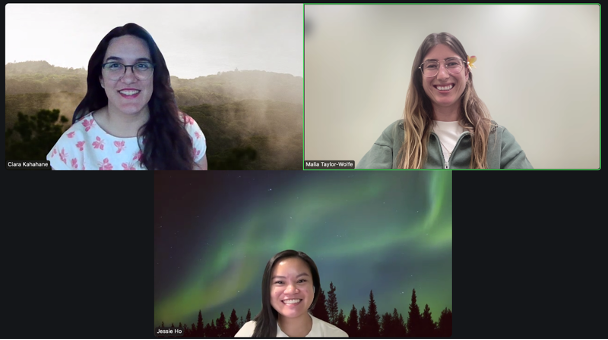
ELP Research Associates Malia Taylor-Wolfe ’25 and Jessie Ho ’26 chat with Ciara Kahahane ’19 over ZOOM after Kahahane’s appointment as First Deputy of the Commission on Water Resource Management.
Top: Ciara Kahahane ‘19, Malia Taylor-Wolfe ʻ25
Bottom: Jessie Ho ‘26
This past August, Hawai‘i Governor Josh Green appointed Ciara (pronounced Key-ruh) Kahahane as First Deputy of the Commission on Water Resource Management (CWRM or the “Water Commission”). Kahahane graduated from the William S. Richardson School of Law (WSRSL) in 2019. On November 5th, Environmental Law Program Research Associates Malia Taylor-Wolfe ‘25 and Jessie Ho ‘26 caught up with Kahahane over Zoom to congratulate her and get some insight into her journey to the Water Commission.
Originally from Lahaina, Maui, Kahahane grew up with a large extended family who inspired her to advocate for equal access to justice for Native Hawaiians. These feelings were solidified during her undergraduate career at the University of Hawai‘i at Mānoa where she received a degree in Hawaiian Studies. She attested to her inspiration being strengthened while attending classes like Native Hawaiian Rights with Professor Wendell Kekailoa Perry, and Ceded Lands with Professor April Drexel. “Both [classes] were really fascinating and they really piqued my interest in [those areas] of law,” Kahahane reminisced.
In describing her law school journey, Kahahane attributed several landmark experiences, which she believes defined the course of her life and brought her to her current position with CWRM. One was her two-year position as a research assistant for Professor Emerita Mari Matsuda. Kahahane characterized Professor Matsuda as “brilliant, kind, caring, passionate about the rule of law, [and] passionate about the Constitution.” She added, “I like to think that some of that rubbed off on me, because I am also passionate about [those things].”
Kahahane shared further that her service as a teaching assistant for Professor Emeritus Eric Yamamoto in Civil Procedure also deepened her understanding of the legal framework underpinning the state’s water resource issues.
Additionally, Kahahane honed her skills in advocacy and leadership through her involvement with the National Environmental Law Moot Court Competition team and as a student senator to the Student Bar Association.
After graduating, Kahahane gained diverse legal experience working in positions that prepared her for the complexities of water resource management. She clerked at the U.S. Bankruptcy Court and worked at the Department of the Attorney General in various divisions, including Public Safety and Hawaiian Home Lands. Her time in the Complex Litigation Division, in particular, sharpened her ability to handle multifaceted legal challenges—a skill she draws upon frequently at the Water Commission.
“I paddle, and the Water Commission steers,” Kahahane said, describing her role in the Commission. Confirmed on October 31st, she has already embraced the unique responsibilities of managing Hawai‘i’s most critical resource. Kahahane shared that site visits across the state have been one of the most rewarding aspects of her work, allowing her to connect directly with the communities and ecosystems affected by the Commission’s decisions.
Kahahane identified declining rainfall estimates and the uncertain impacts of climate change as among the most pressing water-related issues in Hawai‘i. “Understanding the state of water resources is an evolving science,” she explained. Her goals include increasing the Commission’s capacity to monitor water resources more effectively. Initiatives such as drilling deep monitoring wells and updating stream monitoring technologies are underway to ensure that decisions are based on comprehensive and accurate data. The Commission is also exploring remote monitoring solutions and partnerships to enhance efficiency and reduce the workload on its staff.
Traditional Hawaiian practices and values play a pivotal role in the Commission’s work. Kahahane emphasized the importance of integrating Ka Pa‘akai analyses into permitting processes to protect traditional and customary practices. “Our goal is to consider Native Hawaiian rights at every step of the process,” she said, acknowledging that balancing competing interests such as environmental protection, agriculture, and urban development requires careful listening and adherence to the law. “We let the law guide us,” Kahahane said, adding that the Commission strives to listen to all sides without presumption.
One project that excites Kahahane is the Commission’s partnership with the Mesonet weather monitoring network to gather climate data. These efforts will provide critical insights into Hawai‘i’s changing hydrological landscape and inform sustainable water management practices.
When asked what advice she would give her younger self, Kahahane responded, “Don’t be scared; go for it! Push yourself.” She also offered words of encouragement for current students pursuing careers in public interest or with the Department of Land and Natural Resources (DLNR): “Government work is incredibly important, and young attorneys have unique opportunities to make a difference.”
For students interested in gaining firsthand experience with the Water Commission, Kahahane confirmed that the Commission is accepting externs and pro bono volunteers. Interested students can reach out to the Commission at DLNR.CWRM@hawaii.gov.
Kahahane’s journey illustrates her dedication to addressing water resource challenges in Hawai‘i through a combination of legal expertise, cultural awareness, and collaboration. Her role at the Water Commission underscores the importance of managing the state’s resources sustainably while considering diverse perspectives and values.
Moreover, Kahahane’s path highlights the diverse pathways available to law students who are passionate about making a difference in their communities. Her dedication to integrating cultural values, scientific data, and legal principles into her work serves as an example of how legal training can be applied to address real-world challenges. For aspiring attorneys, her story underscores the impact that perseverance and a commitment to public service can have on shaping a meaningful career. Congratulations, First Deputy Kahahane!
JH 1/31/25
